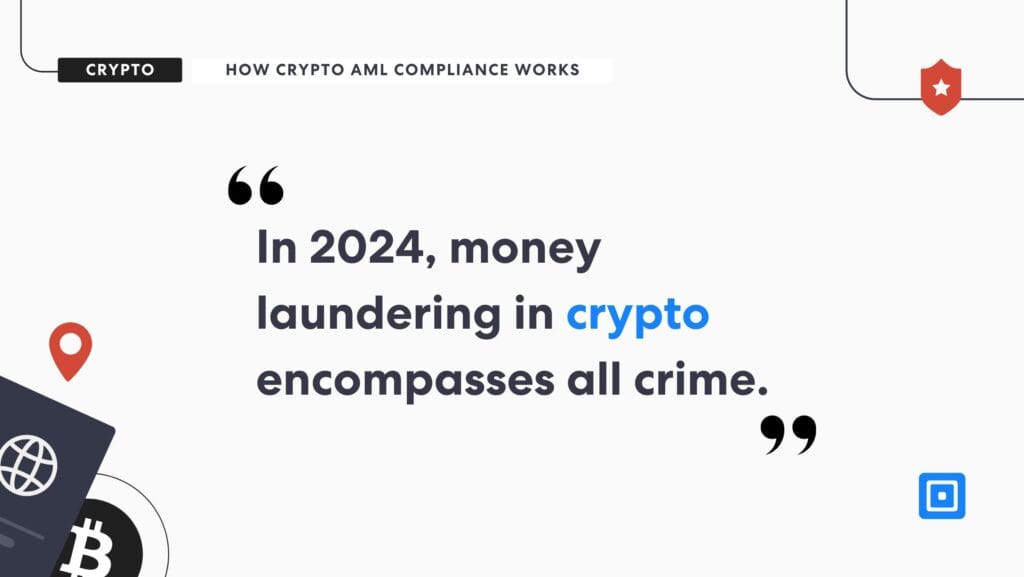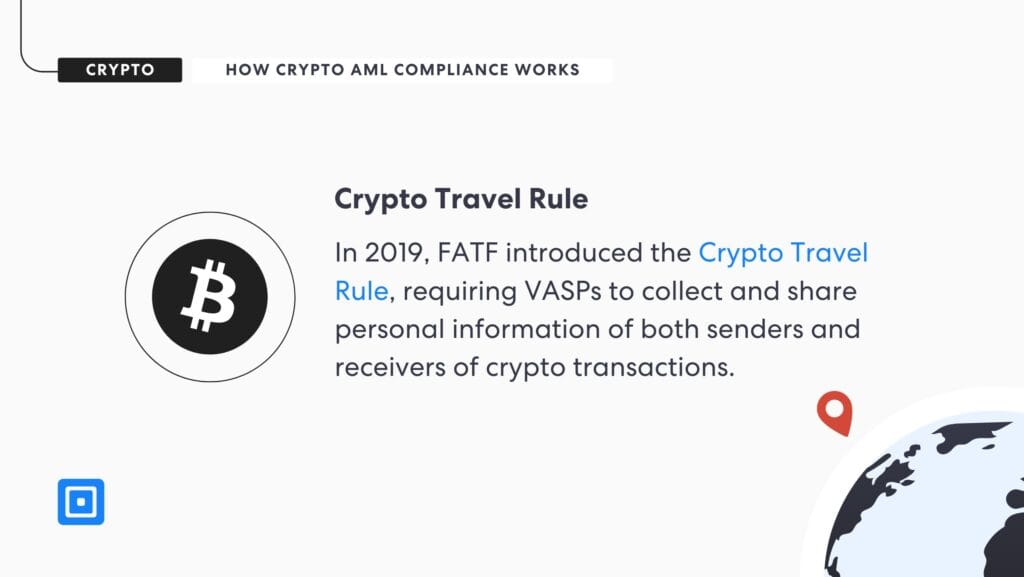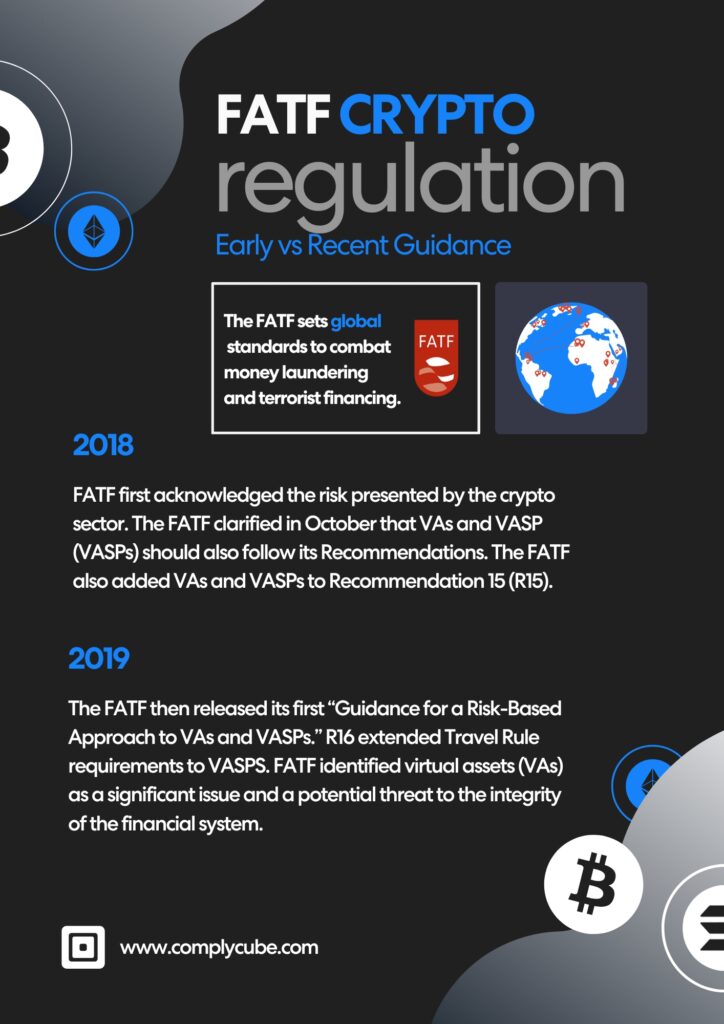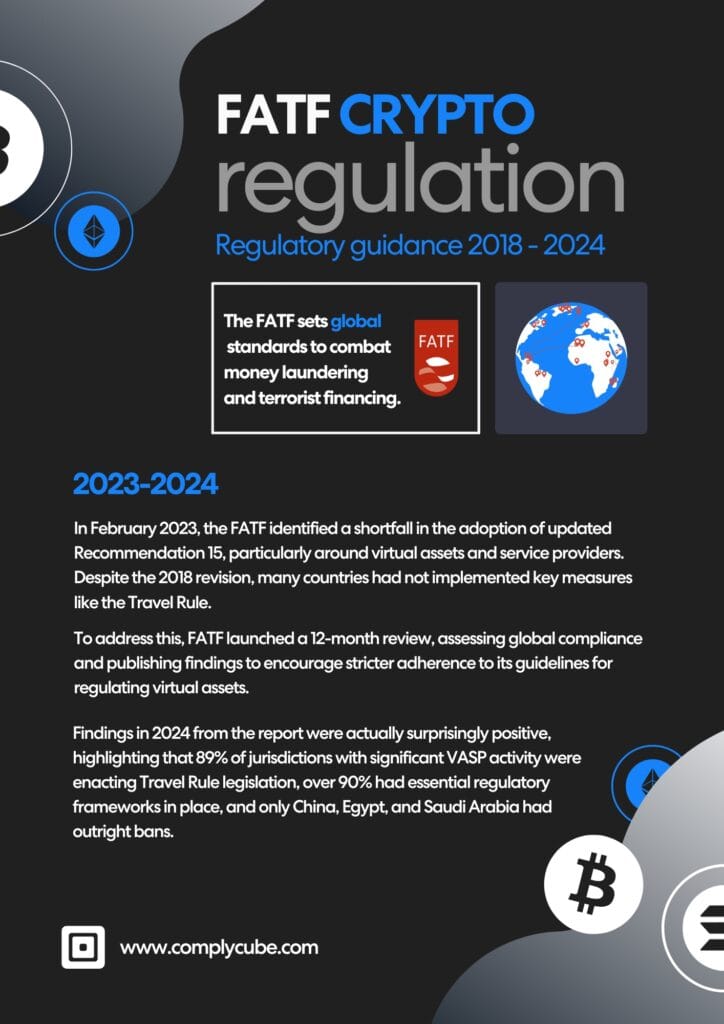FATF crypto guidance leads global and UK crypto regulation policies, which have evolved drastically since 2018 as the threat perceived by the industry has increased. Due to their anonymity, digital assets have become a significant avenue for money laundering. In 2022, laundering volumes reached $31.5 billion, dropping to $22.2 billion in 2023, showing some progress. Yet, these figures are still alarmingly high.

During the same period, the concentration of laundering through the top five off-ramping services (platforms converting crypto to fiat currency) increased from 68.7% to 71.7%. This highlights the urgent need for stricter KYC and AML procedures at major crypto institutions to mitigate financial crime.
In 2022, laundering volumes reached $31.5 billion.
In 2024, money laundering in crypto encompasses all crime, meaning that crypto-related money laundering is not limited to activities that are directly tied to the crypto ecosystem, such as hacks or fraud within crypto exchanges. Instead, it now includes proceeds from any type of criminal activity, both traditional (e.g., narcotics trafficking) and digital. This guide will dive into how the FATF defines Virtual Assets (VAs), the financial crime threat they pose to worldwide economies, and how FATF regulation evolved through its early stages.
How does the FATF define VAs?
The FATF defines a virtual asset as “a digital representation of value that can be digitally traded or transferred and can be used for payment or investment purposes. Virtual assets do not include digital representations of fiat currencies, securities, or other financial assets that are already covered elsewhere in the FATF Recommendations.”
The definition of virtual assets underscores their function as digitally tradable or transferable forms of value that can be used for payment or investment purposes, distinguishing them from more traditional assets.
Overview of FATF’s Early Crypto Guidance
The FATF began providing official guidance for the crypto sector in 2019. The organization issued its initial recommendations on adopting a risk-based approach to virtual assets and Virtual Asset Service Providers (VASPs), while also updating its standards to introduce mandatory measures for regulating and overseeing virtual asset activities. For an initial overview of how crypto regulations and guidance protect the industry, read “How KYC Crypto Regulations Safeguard the Industry.”
2018: In October of 2018, the FATF first acknowledged the risk presented by the crypto sector. Cryptocurrencies were mainly considered to be unregulated virtual assets (VAs) at the time, with most parts of the world not having implemented formal regulation to address these digital assets.
The FATF clarified in October that VAs and VASPs should also follow its Recommendations, which until then had mainly targetted the traditional financial sector. Similarly, the added clear definitions for VAs and VASPs. The FATF also added VAs and VASPs to Recommendation 15 (R15), extending its guidance to make sure these organisations followed Anti-Money Laundering (AML) and Counter Financing of Terrorism (CFT) directives.

2019: On the 21st of June (2019), the FATF identified virtual assets (VAs) as a significant issue and a potential threat to the integrity of the financial system. The FATF also released a statement on virtual assets and providers, which included the following: “The threat of criminal and terrorist misuse of virtual assets is serious and urgent, and the FATF expects all countries to take prompt action to implement the FATF Recommendations in the context of virtual asset activities and service providers.”
The threat of criminal and terrorist misuse of virtual assets is serious.
The FATF then released its first “Guidance for a Risk-Based Approach to VAs and VASPs.” This addressed how VAs and VASPs fall within FATF views and recommendations. It also adopted an interpretative note to R15, which clarified how different mandates for VAs and VASPs should be applied. R16 extended Travel Rule requirements to VASPS. For more on the Travel Rule, read “The Crypto Travel Rule: The Need for AML Compliance Software.”

2023-2024: FATF’s Global Evaluation of Virtual Asset Regulation
In February 2023, the Financial Action Task Force (FATF) Plenary identified a considerable shortfall in implementing its updated Recommendation 15, particularly regarding Virtual Assets (VAs) and Virtual Asset Service Providers (VASPs). Although the October 2018 revision sought to incorporate measures like the Travel Rule for VAs and VASPs, many countries had yet to adopt these enhanced standards.
To tackle this issue, the Plenary set forth a roadmap focused on strengthening the implementation of FATF Standards related to VAs and VASPs. This plan involved conducting a thorough evaluation of implementation levels across the global network.
After 12 months of watching and evaluating global levels of compliance with the Travel Rule, the FATF published their report, highlighting the status of jurisdictions with significant virtual asset service provider (VASP) activity regarding their implementation of FATF Recommendation 15 (which includes the Travel Rule).
The published report unveiled 3 key findings:
- Progress was found in the implementation of the Travel Rule: Almost 89% of the jurisdictions with important VASP activity are enacting or have enacted Travel Rule legislation.
- More than 90% of jurisdictions with significant VASP activity have implemented essential measures to regulate and oversee virtual assets and virtual asset service providers.
- Only three jurisdictions with significant VASP activity—China, Egypt, and Saudi Arabia—have explicitly banned virtual assets and virtual asset service providers.
The release of this report granted global insights into the landscape of crypto regulations, with the findings pointing to a key understanding of the importance of crypto compliance measures.

How UK Crypto Firms to Align with FATF Guidelines
The FCA ensures that UK legislation follows FATF global guidelines, ensuring that the country follows international mandates. The Money Laundering, Terrorist Financing, and Transfer of Funds (Information on the Payer) Regulations 2017 (MLRs), which was amended in 2019, require crypto firms to follow these steps:
- Register with the FCA: All UK crypto businesses need to receive authorization from the FCA for AML/CFT compliance.
- Apply the Travel Rule: Businesses need to collect and share information on transaction origins and beneficiaries.
- Implement KYC and AML controls: Organizations need to ensure that there is ongoing due diligence on customers and on transactions. Ensuring that KYC measures are stringent helps reduce the chance of fraudulent practices.
Higher-risk customers therefore need ongoing monitoring.
The FCA, like the FATF, believes in a risk-based approach, stating, “Our supervisory approach to cryptoasset businesses is in line with our approach to other businesses under the MLRs. It is risk based so that businesses which pose the greatest money laundering and terrorist financing risk receive an increased level of supervisory focus. Higher-risk customers therefore need ongoing monitoring.”
Ensuring Compliance in Crypto
Crypto platforms now bear a significant responsibility to protect the integrity of the financial system. With the continued expansion of the crypto ecosystem, capital inflows are projected to rise even further in 2024 and 2025.
It’s crucial that customer onboarding processes are optimized to smoothly convert potential users into active participants while simultaneously adhering to robust consumer protection standards. Maintaining this balance will be essential to foster both trust and security in the rapidly growing sector. For more on why stringent KYC measures are needed in crypto, read “The Dangers a No KYC Crypto Exchange Can Bring.“

If your client acquisition process is proving a challenge to scale or if you are seeking solutions in AML, KYC, and IDV, get in touch with one of ComplyCube’s specialists today.



